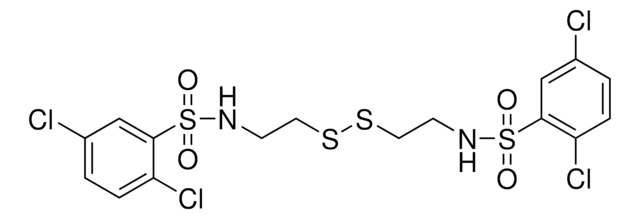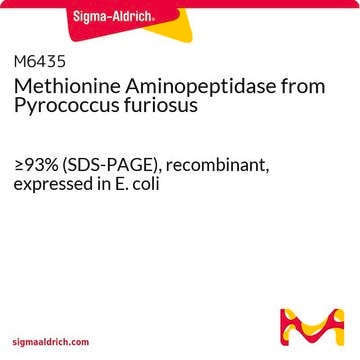15862
Cobalt chloride 0.1 M solution
Synonym(s):
Cobalt(II)-chloride solution, Additive Screening Solution 24/Kit-No 78374
Sign Into View Organizational & Contract Pricing
All Photos(1)
About This Item
CAS Number:
MDL number:
UNSPSC Code:
12352302
PubChem Substance ID:
NACRES:
NA.32
Recommended Products
Quality Level
density
1.01 g/mL at 20 °C
storage temp.
2-8°C
SMILES string
Cl[Co]Cl
InChI
1S/2ClH.Co/h2*1H;/q;;+2/p-2
InChI key
GVPFVAHMJGGAJG-UHFFFAOYSA-L
Application
Cobalt chloride 0.1M solution has been used to simulate hypoxic exposure and HIF-1 (hypoxia-inducible factor 1) expression in prostate cancer cells. It has been used to induce hypoxia in human intestinal epithelial cells.
Biochem/physiol Actions
Cobalt chloride induces hypoxia condition in cells by upregulating hypoxia-inducible factor-1α (HIF-1α), erythropoietin and glycolytic enzymes. It is also responsible for mitochondrial DNA damage in rat neuronal PC12 cells. It is also responsible for the induction of apoptosis.
Cobalt chloride 0.1M solution is an additive screening solution of Additive Screening Kit. Additive Screen kit is designed to allow rapid and convenient evaluation of additives and their ability to influence the crystallization of the sample. The Additive Kit provides a tool for refining crystallization conditions.
Cobalt chloride 0.1M solution is an additive screening solution of Additive Screening Kit. Additive Screen kit is designed to allow rapid and convenient evaluation of additives and their ability to influence the crystallization of the sample. The Additive Kit provides a tool for refining crystallization conditions.
Signal Word
Danger
Hazard Statements
Precautionary Statements
Hazard Classifications
Aquatic Chronic 2 - Carc. 1B - Repr. 1B
Storage Class Code
6.1D - Non-combustible acute toxic Cat.3 / toxic hazardous materials or hazardous materials causing chronic effects
WGK
WGK 3
Flash Point(F)
Not applicable
Flash Point(C)
Not applicable
Personal Protective Equipment
dust mask type N95 (US), Eyeshields, Gloves
Choose from one of the most recent versions:
Already Own This Product?
Find documentation for the products that you have recently purchased in the Document Library.
Customers Also Viewed
CoCl(2) induces apoptosis via the 18 kDa translocator protein in U118MG human glioblastoma cells.
Zeno S, et al.
Biochemistry, 48, 4652-4652 (2009)
Mitochondrial DNA damage and a hypoxic response are induced by CoCl(2) in rat neuronal PC12 cells.
Wang G, et al.
Nucleic Acids Research, 28, 2135-2135 (2000)
Francesca Lazzara et al.
Frontiers in pharmacology, 11, 1063-1063 (2020-08-28)
Retinal hypoxia is one of the causative factors of diabetic retinopathy and is also one of the triggers of VEGF release. We hypothesized that specific dysregulated miRNAs in diabetic retinopathy could be linked to hypoxia-induced damage in human retinal endothelial
Downregulation of duodenal SLC transporters and activation of proinflammatory signaling constitute the early response to high altitude in humans.
Wojtal KA, et al.
American Journal of Physiology: Gastrointestinal and Liver Physiology, 307, G673-G673 (2014)
Exposure to hypoxia following irradiation increases radioresistance in prostate cancer cells.
Hennessey D, et al.
Urologic Oncology, 31, 1106-1106 (2013)
Our team of scientists has experience in all areas of research including Life Science, Material Science, Chemical Synthesis, Chromatography, Analytical and many others.
Contact Technical Service







